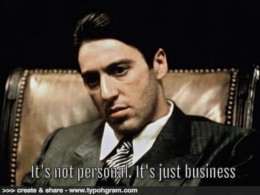“What Does Your Father Do?”

Over at Slate, John Swansburg has written a thought-provoking essay about the American myth of the “self-made man,” how we’re fixated on this idea that we can pull ourselves up by our bootstraps like some of our favorite rich people once did, despite the fact that no one has bootstraps anymore or even would be able to pick bootstraps out of a line up with girdles and spats.
In the intro, he delves into how his own father got started in business:
Mostly, though, my father made his money in real estate. Specifically, he bought and sold buildings he affectionately refers to as “pigs”: big, ugly industrial spaces. Buildings with saw-tooth roofs and wrinkle-tin sides. Buildings that housed sheet metal shops, produce-industry middle-men, discount-furniture-store distribution hubs. In his late 20s and early 30s, the years before he bought the Hilltop, he built a small empire in the hardscrabble ring around Boston: in Charlestown, Everett, the precincts of Cambridge that Harvard and MIT students studiously avoid, and in Chelsea, where his first roofing shop had been. I once asked my father how he knew when a pig was a good investment, since aesthetics, and even location, seemed not to factor into his calculus. “When I’m looking at a building,” he said, “I drive up to it. If my balls tingle, I buy it. Otherwise, I don’t.”
Origin stories! So cool. My dad wanted to be an English professor but it was war time. So as not to get drafted to go fight in Vietnam, he ducked into law school at the advice of a prof, and ended up a lawyer, and that was it for the rest of his life. These things so often happen by chance. Except in America we don’t believe in chance. We believe in Hard Work:
When the Pew Economic Mobility Project conducted a survey in 2009 — hardly a high point in the history of American capitalism — 39 percent of respondents said they believed it was “common” for people born into poverty to become rich, and 71 percent said that personal attributes like hard work and drive, not the circumstances of a person’s birth, are the key determinants of success. Yet Pew’s own research has demonstrated that it is exceedingly rare for Americans to go from rags to riches, and that more modest movement from the bottom of the economic ladder isn’t common either. In fact, economic mobility is greater in Canada, Denmark, and France than it is in the United States. … even a finding that France — France! — is a better place to move on up has done little to diminish our sturdy belief in our exceptionalism.
We are certainly a country of “sturdy belief”: undeterred by proof, we believe in angels but not vaccines, death panels but not climate change. It’s enough to make a person glum. That said, we also believe in charity and volunteering, so it’s not all bad.
But why do we stick onto this fantasy that anyone, from any background, can make it if they try? (The “10,000 hours” idea, science helpfully tells us, is bunk; so much depends, as the poet might say, on the red wheelbarrow of your genes, glazed with the rainwater of your upbringing, beside the white chickens of Who You Know.) Swansburg profiles seven individuals — six men and one women — starting with quintessential American Benjamin Franklin to help us better understand ourselves.
Meanwhile, though, let’s talk about our own origin stories! How did your parents end up doing what they did/do? By accident? Through deliberate planning? Through knowing the right people? How did your family experience the American Dream?
Support The Billfold
The Billfold continues to exist thanks to support from our readers. Help us continue to do our work by making a monthly pledge on Patreon or a one-time-only contribution through PayPal.
Comments